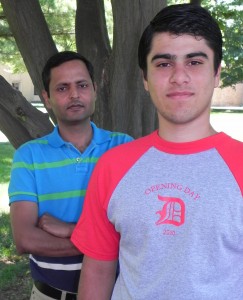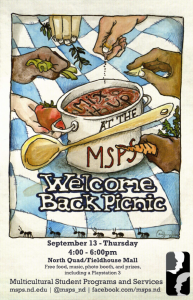Third-year biological sciences major Olaf Rodriguez is one focused and motivated student. His most recent accomplishment was the publication of “Translational selection of genes coding for perfectly conserved proteins among three mosquito vectors” in the journal of Infection, Genetics, and Evolution. He was the lead author for the research team. Rodriguez studied the translational efficiency of genes among three mosquito vector species including those of dengue virus, malaria, and West Nile Virus. His work was guided by Dr. Susanta Behura, a research assistant professor in the Eck Institute for Global Health, who investigates dengue susceptibility in Aedes aegypti. This mentorship was fostered in Rodriguez’s first year through Building Bridges, a mentoring program in Multicultural Student Programs and Services (MSPS), and it has proven instrumental in Rodriguez’s research success.
Rodriguez had a strong interest in genomics applications in diseases and disease causing vectors in high school, leading him to the partnership with Dr. Behura. Building Bridges provided the connection between Rodriguez and Dr. Behura to further his research interests. Rodriguez commends Dr. Behura for his commitment to developing his interest in biology: “Without Behura’s unending patience, phenomenal instruction and complete willingness to dedicate so much of his time to my progress, this publication would not have been possible.” Dr. Behura calls Building Bridges an “innovative and strategic mentoring program that helps students excel in their overall academic achievements including enhancing research experiences in different fields.” He emphasizes the active role Building Bridges has played in creating partnerships between undergraduates and faculty.
Rodriguez’s goals for the future continue to motivate him and shape his time management skills and study habits as he pursues an undergraduate degree in biological sciences. Dr. Behura describes Rodriguez’s systematic manner towards achieving the goals of a research project, speed and efficiency, and natural talent in computing and data analysis as tremendous assets in the lab. These factors have led to the exceptional accomplishments the two have achieved in their research together.
On a final note, Rodriguez offers some advice to first-year students or any students involved in research. When working with professors and mentors, “no matter how many times it takes for it to click, or for you to remember, ask questions, write down the response, and don’t be afraid to ask for help,” says Rodriguez. He also emphasizes the importance of learning the basics in order to build on these skills in the future to promote deeper learning. Dr. Behura explains the importance of engaging in research early on: “If they can hit the ground running at this early stage, they will have tremendous opportunities to excel in graduate level research and to publish and demonstrate their leadership in the field.”



